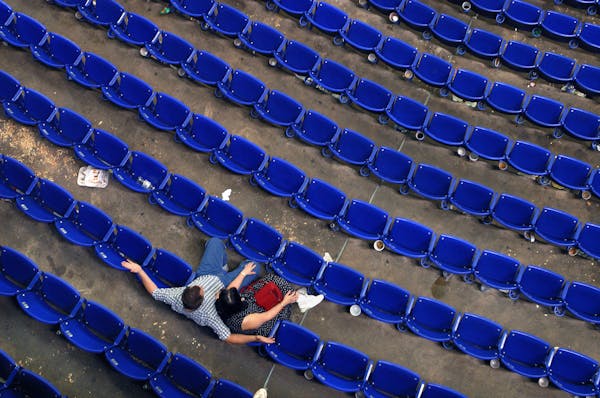A massive, $400 million deal to reshape the east end of downtown Minneapolis is plowing ahead at City Hall, but controversial rooftop signs are proving to be a major last-minute hurdle.
City officials unveiled more details Thursday about the plan shaping up on Star Tribune land next to the new Vikings stadium, including office space, apartments, retail, a parking ramp and a park. Ryan Cos. is financing $350 million of the proposal, which will feature the largest Minneapolis office development in 22 years — totaling 1.1 million square feet.
But the expected owner of the new office buildings, Wells Fargo, is demanding bright logos atop the buildings that would be visible during football game aerial shots. The signs would require a change in the zoning code and are fiercely opposed by the Vikings, who say the signs could hurt their efforts to sell naming rights on the stadium.
"It's an important issue for Wells Fargo that has to be resolved before they'll make a final commitment to moving forward," Ryan Vice President Rick Collins said Thursday. Outgoing Mayor R.T. Rybak, the city's face on the project, supports Wells Fargo's request.
The Vikings opposition is important since the overseer of stadium construction, the Minnesota Sports Facilities Authority, must sign off on the term sheet of the deal.
"The way the stadium legislation set up, our agreement with the stadium authority is that all decisions on the project have to be unanimous between the … Vikings and the stadium authority," said Vikings Vice President Lester Bagley. He said the Wells Fargo roof signs are the "one open issue."
Wells Fargo spokeswoman Peggy Gunn warned that they have a contingency allowing them to withdraw from the project.
"We are making a $300 million investment, that's what's on the table here," she said. "And we think it's reasonable that some signs reflecting this investment be allowed."
Michele Kelm-Helgen, the chairwoman of the authority, said signs are not addressed in the agreement. She said Wells Fargo and the Vikings are talking about signs, "but that's unrelated to our tri-party agreement at this point."
The city's portion of the deal involves borrowing $62 million to pay for a basic park and a portion of a new, 1,600-stall parking ramp. The success of the city-owned park will depend heavily on a fundraising effort to develop and operate it, boosted Thursday by $1 million from the Vikings. Much of the $20 million in city funding will be used for land acquisition and demolition of the Star Tribune headquarters.
Rybak, who will take part in the fundraising, said contributions supporting the park will be highlighted in a tasteful way, citing the example of Millennium Park in Chicago. He would like to see concerts, playing fields and a possible restaurant to draw visitors, while hoping the city would contract with the Park Board to oversee operations.
The park will span approximately one and two-thirds blocks, with the remaining third allocated to Ryan for residential development.
Council Member Cam Gordon, during a committee meeting Thursday, said the park must serve the city's youth rather than merely become a "lawn for the wealthy."
The parking ramp, which satisfies a parking requirement in the stadium legislation, will be built with $32.6 million from the city and another $17.9 million from the Minnesota Sports Facilities Authority. The authority will also pay $10.7 million to build skyways.
Revenue from the ramp and another underground ramp nearby are expected to pay off the city's debt. Ryan also has guaranteed to cover any shortfalls for at least 10 years, concluding when the ramps draw a steady $4 million in revenue.
The city also is expecting to make money from selling the development rights atop the new parking ramp. As soon as the plan is passed at the council, the city will seek proposals for that space so plans for the ramp and development can be made in tandem.
Asked whether building a major parking ramp next to the future intersection of several transit lines represents a clash of urban visions, Rybak observed that the stadium bill required the parking spaces near the new Vikings stadium.
"Those ramps were going to be built anyway as part of the stadium. The only difference is we've used them to leverage the major office development," he said. He suggested that the City Council put tight restrictions on parking in that area to create the walkable district that's envisioned.
One hiccup in the vision for the park has been Park and Portland Avenues, which intersect the two blocks but won't be closed after objections from key officials at Hennepin County, which owns the streets. A city staff report says they may be instead redesigned to be narrowed and have a more parklike feel.
Collins, of Ryan, would not say what they're paying for the Star Tribune land. Previous estimates from city staff showed it would be worth about $38 million.
The plan will go through several committees next week before expected approval on Dec. 13, the final City Council meeting. In addition to approving the project itself, the council will need to override a decision by the Heritage Preservation Commission to stop demolition of the Star Tribune building.
Eric Roper • 612-673-1732
Twitter: @StribRoper

Want to share info with the Star Tribune? How to do it securely

'Safe recovery sites' would offer syringes, naloxone and more to people using drugs. The plan could be in peril.
New Minnesota GOP leaders seek peace with party's anti-establishment wing

Who is Republican Lisa Demuth, Minnesota's first House speaker of color?

